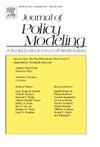言行一致吗?印度货币政策需要 "言行一致 "才能锚定通胀
IF 3.1
2区 经济学
Q1 ECONOMICS
引用次数: 0
摘要
透明一致的沟通是中央银行有效决策不可或缺的一部分。在新兴市场,这一挑战更为严峻,因为新兴市场的受众范围广泛且差异巨大,每个人都有自己的信息需求。为了迎合这一多样化的需求,一些央行公布了货币政策委员会(MPC)的决策记录,详细介绍了会议记录和委员们的投票情况。委员们的这种投票模式是否与会议记录中蕴含的他们的观点一致,仍然是一个悬而未决的问题。为了解决这个问题,我们利用印度货币政策委员会的数据,计算了各成员会议的情绪指数,并在控制其他干扰因素后,将其与成员的投票行为相关联。与之前的研究不同,我们的分析除了鹰派和鸽派情绪外,还加入了中性情绪。研究结果表明,货币政策委员会成员在会议上表达的情绪并不总是反映在他们的投票行为中,这就造成了行动(投票)与言辞(情绪)之间的差距。尽管内部成员与外部成员之间存在不同的影响,但稳健性检验强化了这些发现。从政策角度来看,分析表明,货币政策委员会需要 "言行一致 "才能有效锚定通胀。本文章由计算机程序翻译,如有差异,请以英文原文为准。
Do deeds match words? India’s monetary policy needs to “walk the talk” for inflation anchoring
Transparent and consistent communication is integral for effective central bank policymaking. The challenge is more acute in emerging markets where the spectrum of audience is wide and significantly heterogenous, each with their own information needs. To cater to this diverse spectrum, several central banks publish the records on Monetary Policy Committee (MPC) decision, detailing the minutes and voting by members. Whether such voting pattern by the members is consistent with their sentiments as embedded in the minutes of meetings remains an open question. To address this issue, we utilise data from Indian MPC, compute a sentiment index across member-meetings, and correlate it with their voting behaviour, after controlling for other confounding factors. Unlike prior studies, our analysis onboards a neutral sentiment, in addition to hawkishness and dovishness. The findings reveal that sentiments expressed by members in the MPC meetings is not always reflected in their voting behaviour, creating a chasm between deeds (voting) and words (sentiments). Robustness tests reinforce these findings, although there exist differential effects across internal versus external members. From a policy standpoint, the analysis suggests that MPCs need to ‘walk the talk' for effective inflation anchoring.
求助全文
通过发布文献求助,成功后即可免费获取论文全文。
去求助
来源期刊

Journal of Policy Modeling
ECONOMICS-
CiteScore
6.20
自引率
11.40%
发文量
76
期刊介绍:
The Journal of Policy Modeling is published by Elsevier for the Society for Policy Modeling to provide a forum for analysis and debate concerning international policy issues. The journal addresses questions of critical import to the world community as a whole, and it focuses upon the economic, social, and political interdependencies between national and regional systems. This implies concern with international policies for the promotion of a better life for all human beings and, therefore, concentrates on improved methodological underpinnings for dealing with these problems.
 求助内容:
求助内容: 应助结果提醒方式:
应助结果提醒方式:


